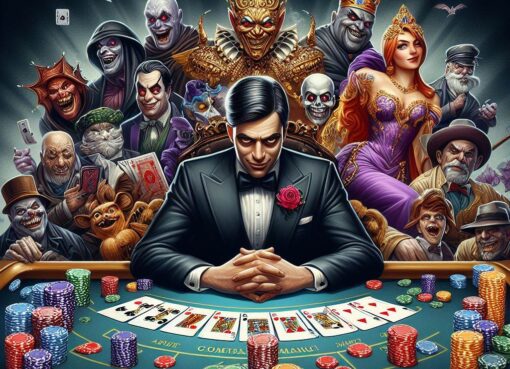Poker Face Unveiled: Psychological Tactics for Dominating the Table

for Dominating the Table
Poker is not merely a game of cards; it is a complex battle of wits, where psychological insights often determine the victor. To dominate at the poker table, mastering the art of non-verbal communication and mental manipulation is just as important as knowing the odds. for Dominating the Table Here’s how you can employ psychological tactics to turn the game in your favor.
Understanding the Power of the Poker Face
The term “poker face” refers to an expressionless face that gives away no clues about the hand you’re holding. It’s your first line of defense, preventing opponents from reading your intentions. However, a good poker face goes beyond merely being stoic; it’s about creating a consistent persona that includes body language and betting patterns. for Dominating the Table Consistency is key, as any deviation from your normal behavior can provide keen observers with insights into your strategy.
The Art of Misdirection
Misdirection is a powerful psychological tactic used not only in magic but in poker as well. By controlling your opponents’ focus, you can manipulate their perception of your play. for Dominating the Table This can be done by varying your playing speed, talking at certain times, or even showcasing selective hands to create a misleading pattern. The goal is to keep your rivals guessing, making it harder for them to develop a counter-strategy.
Reading Your Opponents
Just as you mask your own tells, you must become adept at deciphering others’. Pay close attention to changes in body language, betting patterns, and even speech. Does an opponent’s hand tremble slightly when making a bet, or do they become unusually chatty? Such cues, often subtle, can reveal the strength of a hand or a bluff in progress.
Emotional Manipulation
Poker is as much about playing the players as it is about playing the cards. Emotional manipulation involves influencing the emotional states of your opponents, inducing mistakes or poor judgment. For instance, you can project confidence to intimidate, or display false weakness to bait into traps. However, this strategy requires you to be very observant and sensitive to the mood at the table.
Psychological Endurance
Endurance in poker involves maintaining mental and emotional stamina over long sessions. This is critical in tournaments or in games that stretch for many hours. Practicing stress management techniques and keeping your decision-making sharp can prevent fatigue from costing you the game. Staying calm under pressure and keeping your strategic focus can set you apart from less disciplined players.
Strategic Flexibility
The ability to adapt your strategy based on the shifting dynamics of the game is a crucial psychological tactic. This means not sticking rigidly to one style of play but rather evolving as the game progresses. Observing the table and adapting to the flow of the game can often provide opportunistic moments to capitalize on.
Use of Tactical Pauses
Pausing before you act can serve multiple psychological purposes. It can convey strength or uncertainty, influencing how opponents respond to your plays. These pauses allow you additional moments to read the table and make more calculated decisions.
Mastering poker requires understanding the intricacies of human psychology just as much as the rules of the game. By developing a solid poker face, learning to read opponents, manipulating emotional states, and maintaining psychological stamina, you can gain a formidable edge. Remember, every player at the table is a puzzle to solve, and each hand provides clues not just about the cards, but also about the players themselves. Use these psychological tactics to not just participate in the game, but to control and dominate it.


